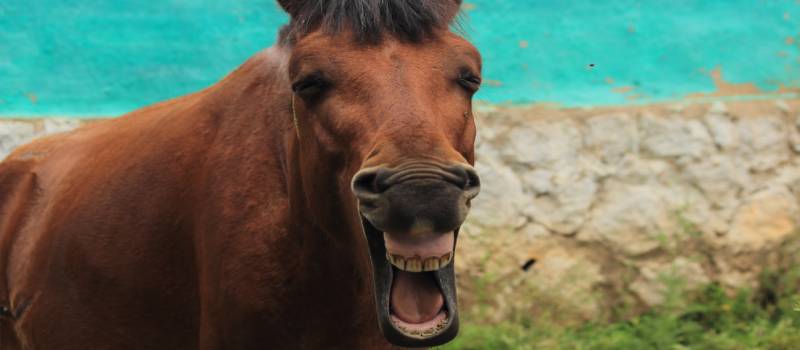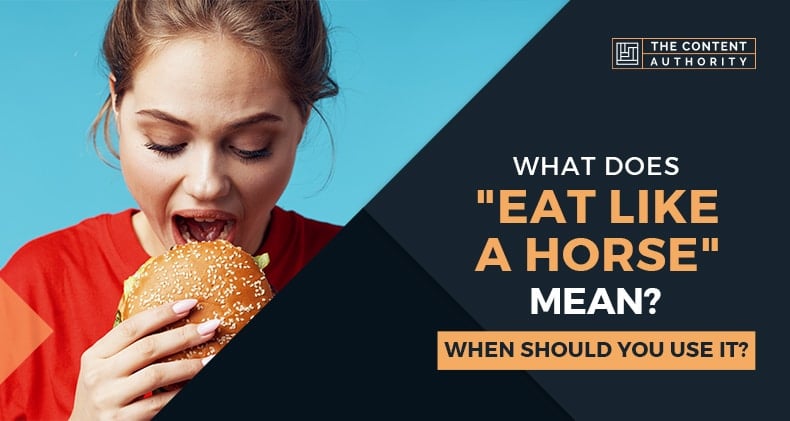How did the meaning of this phrase evolve? You may have wondered what is behind this common phrase and what it stands for in the English language. Let’s look into some further details on the phrase “eat like a horse.”
“Eat like a horse” means to eat a lot or even too much. You can use this idiom when describing someone who eats a large amount of food. They may eat more than they should or have a big appetite. An example would be: Surprisingly, he is so thin, yet he eats like a horse.
“Eat like a horse” can be used in a wide range of scenarios to express when someone enjoys food a little too much. It is considered an English idiom.
Origin Of Phrase
Since the early 1700s, to “eat like a horse” is a metaphor implying that horses eat a lot. But, do horses REALLY eat all that much?
Some people think the idiom is paradoxical because horses don’t eat uncontrollably. They argue that horses eat hay and eat quite slowly, chewing their food patiently. This statement is not definitive, though.
Other people think that horses do eat voraciously and greedily. A horse weighing 20 pounds can eat close to 20 pounds of food per day. Some eat hay or grass, and some eat grain in large quantities.
A reference to the phrase was published in the Baltimore Sun newspaper on December 28, 1952. The article “Add One Elephant To The Holiday Toll.” Remo, the children’s favorite elephant in Rome, had died on Christmas Eve. It was offering its sympathies to the children on this terrible event. The editors saw a positive lesson even from this sad loss at the Rome zoo. The article, directed to the heart of holiday feasts, stated the following:
“For those of us who have survived the first rounds of holiday feasting, with the New Year’s banquets still to go, there is a moral in Remo’s gourmandian orgy. A person may be as hungry as a bear and may ‘eat like a horse,’ but there are definite limits beyond that.”
“Eat like a horse” was also used in The Pittsburgh Press when they ran advertising espousing the benefits of the Reese Formula R-11. The commercial was released in its August 9, 1929 edition. Mr. B.L. Allen, an assistant foreman of the N&W Railway at Portsmouth, Ohio. He was claiming to be suffering from “nervous indigestion and rheumatism.” He quoted this about the product’s effectiveness:
“I saw the medicine in the window at Fischer & Streich Drug Store, and I decided to get a bottle and try it as I have always tried everything I saw. I am glad to say after taking two-thirds of the bottle, I can ‘eat like a horse,’ sleep like a country boy and feel like a 16-year old boy.”
On July 12, 1882, the St. Joseph Daily Gazette in Missouri published an article. It was about Tug Wilson, the English boxer. A match that was soon happening between Tug Wilson and John L. Sullivan. It was taking place at Madison Square Garden in New York. Sullivan had agreed to lose $1,000, a lot of money at that time, if he didn’t knock Tug down in four rounds. The article referred to the boxer’s training regime as follows:
“There is nothing fluffy about him now. He has hardened his muscles and reduced his weight most remarkably. He can now skip like a squirrel, ‘eat like a horse,’ and move about like a champion pugilist.”
No earlier publications of this idiom are known. There seems to be a leap between the expression “work like a horse” and “eat like a horse.” The first one is recorded from at least 1520. The horses started to take over oxen and began to pull chariots, wagons, sleighs, carriages, and carts.
Besides, the typical ox yokes put so much pressure on the windpipe of a horse that special collars had to be made. If someone is “working like a horse,” it made sense that they would also “eat like a horse” after using so much energy.
How People Use The Phrase

If someone uses the expression “eat like a horse,” they are saying that you or someone is eating or has eaten a lot of food. It can be considered a compliment or an insult depending on the scenario and the people involved; sometimes, it can be used in a humorous tone.
This idiom is most common in family and friends’ conversations. It is used to say someone has a big appetite and maybe eats more than they need.
Examples Of The Phrase In A Sentence

- When Rahina goes hiking, she comes home with a big appetite and eats like a horse.
- My cousin used to eat like a horse. He weighed 250 pounds when he was 19 years old.
- He does not eat like a horse. He prefers to eat small meals and is always following a diet.
- Sam is coming for dinner, and we have to cook a couple of extra steaks because he eats like a horse.
- Ever since we were in school, I remember her eating like a horse. She would always go for second and thirds at the Thanksgiving meals.
- My boyfriend ate like a horse at dinner.
- You shouldn’t eat like a horse at public events; it is not well seen.
- Tamara eats like a horse. If she’s coming to visit you, better buy extra food.
- My date last night was so weird. She was not into me at all, and she ate like a horse.
- When I have a cold, I usually eat like a horse. Isn’t that strange?
- He’s using too much energy working in the garage, and he’s eating like a horse.
- I didn’t care that you were shy; I went ahead and ate like a horse at the birthday party.
- She sleeps through the night, naps on time, eats like a horse, and laughs all day.
- I’m sorry I’ve been eating like a horse; I didn’t have time for breakfast today.
- My roommate eats like a horse; I always find the food I buy disappears too quickly.
- I used to go to all-you-can-eat buffets, but I don’t go anymore. I ended up eating like a horse and feeling sick afterward.
- I try not to eat like a horse when I go on vacation.
“Eat Like A Horse” Dialog

William: Hey, Annie, I am having a party on Friday, and I want to invite you and your family.
Annie: Hi William, thank you, we would love to come!
William: Awesome. It is a BBQ, and we are going to pig out!
Annie: Sounds like fun. What can we bring?
William: Nothing, just your appetite.
Annie: Oh, are you sure? You know we have Xavier and my two teenage sons, and they all eat like horses!
William: No problem, we will make sure there is enough food; I will buy more groceries.
Annie: Okay, well, I am still going to bring some potato salad.
Related Phrases
- Tuck in: to eat with enthusiasm.
She was so hungry, and she tucked in her dinner.
- Eat to excess: to say that someone eats more than they should.
You should never eat to excess; you will end up feeling uncomfortable.
- Pack it away: to say that someone can eat a lot of food in a short time.
I went to a buffet, and I packed it away and got my money worth!
- Put away: to say that someone can eat a lot of food.
Zachary can put away the beer; I don’t know how he finds room. It’s like he has an endless pit!
- Plow through: to say that someone is devouring a large meal.
I was hungry and had to get back to work, so I plowed through my lunch.
- Eat up: to say or tell someone to eat all their food.
You need to eat up everything on your plate, or you will not get to go to the park.
- Polish off: to say someone ate a large amount of food and did it quickly.
I couldn’t believe it; Adam polished off the whole ice cream and then had some pie.
“Eat Like A Horse” Synonyms
- Binge
- Devour
- Overeat
- Overindulge
- Gluttony
- Gorge
Conclusion
If you want to become a better English speaker, adding expressions and idioms is a great way to do so. You don’t need to learn all at once!
Today, the phrase “eat like a horse” simply means that someone eats a LOT of food. When trying to describe a heavy eater or one with a huge appetite, it is the right time to pull out this phrase. Is eating like a horse something you usually do or just on special occasions?
Shawn Manaher is the founder and CEO of The Content Authority. He’s one part content manager, one part writing ninja organizer, and two parts leader of top content creators. You don’t even want to know what he calls pancakes.

